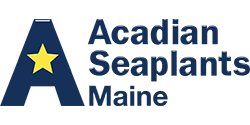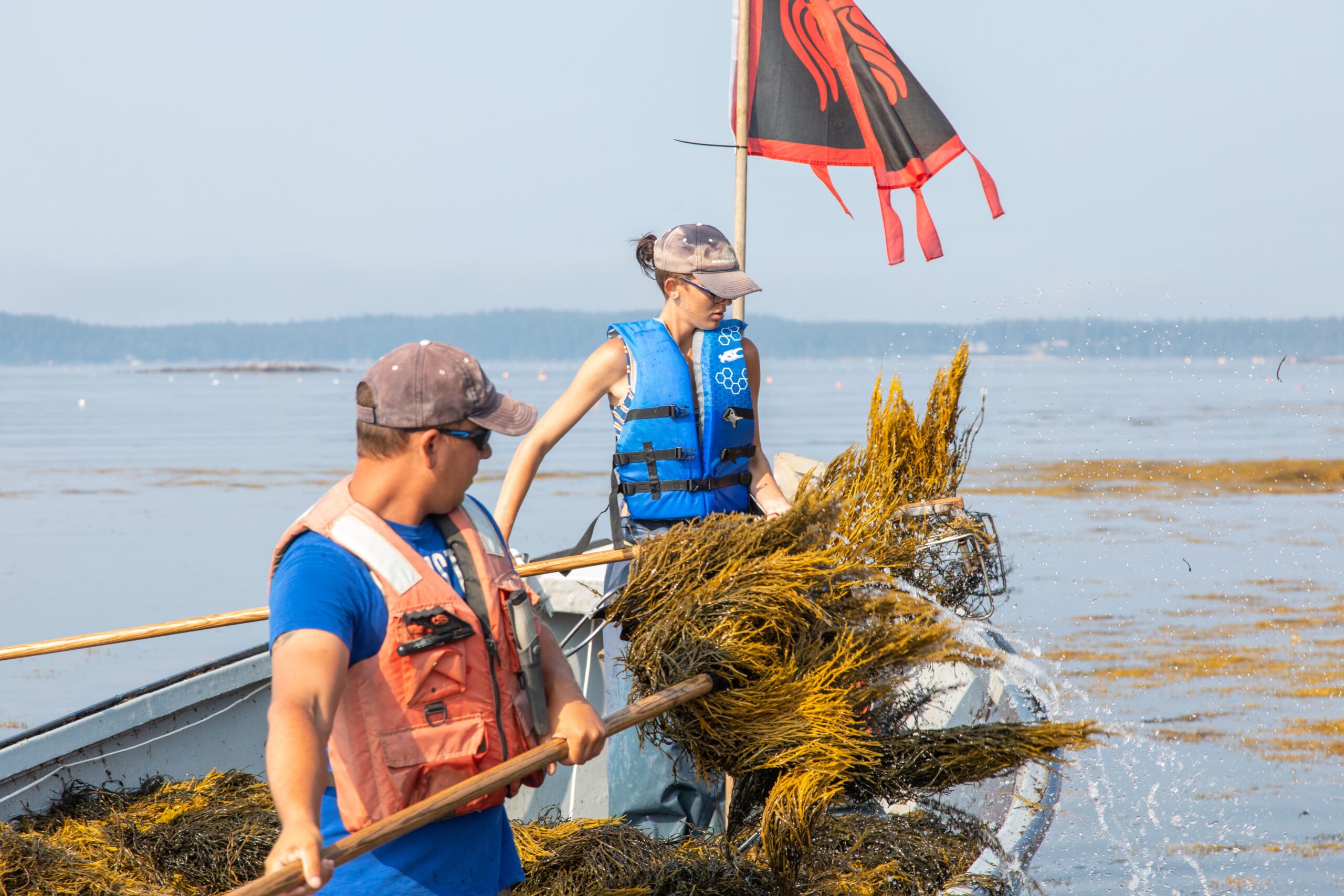
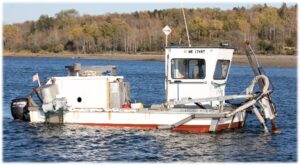
Socioeconomic Impacts
- Acadian spends $1.75 to 2.0 million locally each year
- Acadian employs:
- 6 full-time employees in Washington County, Maine
- 22 – 25 seasonal harvesters
Ecology and Harvest
- Rockweed is not a plant,[1] it is a brown macroalgae (or seaweed), also known as Ascophyllum nodosum
- The oldest Rockweed fronds are generally less than 17-20 years old4. The term old-growth forest does not apply
- Rockweed lives in a very dynamic environment and is adapted to regrow after damage by storm or ice scouring:
- Up to 50% of the Rockweed in Cobscook Bay is naturally detached annually3
- The harvest only takes a small fraction of that Rockweed before it gets naturally removed during winter storms[2]
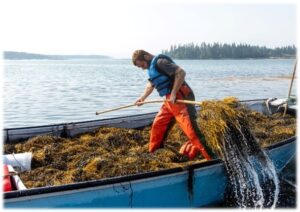 Rockweed is a productive seaweed[3],[4], it relies on its rapid growth to maintain its place in the dynamic intertidal environment
Rockweed is a productive seaweed[3],[4], it relies on its rapid growth to maintain its place in the dynamic intertidal environment- Rockweed covers most intertidal rocky shorelines in Maine
- Rockweed has been harvested sustainably at large-scale for several decades in many countries including the USA, Canada, Iceland, Norway, Scotland, and Ireland
- In Maine, the harvest is conducted using mechanical harvesters or manually using a specially designed cutting rake
- The current harvest in Maine represents less than 1% of the Rockweed found in the Gulf of Maine[5]
- 2019 Court ruling has resulted in a 40% decrease in landings of Rockweed in Maine over the last 5 years
- The harvest only removes a small fraction of the Rockweed in a sector (17-25% of the biomass)
- Rockweed beds recover very quickly after harvest
- In 2023, results were published from a large-scale study carried out at 38 sites by the University of Maine, revealing that biomass recovered to pre-harvest levels within one year after harvest[6]

- A study from Canada showed that recovery took one year after removing 50% of the Rockweed biomass using a cutting rake [7]
- Harvesting increases the productivity of the remaining Rockweed[8]
- In 2023, results were published from a large-scale study carried out at 38 sites by the University of Maine, revealing that biomass recovered to pre-harvest levels within one year after harvest[6]
- There is no long-term impact of commercial harvest after 20 years
- A study from New Brunswick showed that there was no impact on the height or biomass of Rockweed after 20 years of continuous commercial harvesting[9]

- Rockweed harvesting does not have significant impact on habitat or invertebrates:
- A comprehensive review by Dr. Brian Beal from the University of Maine at Machias concluded that “any negative effects on habitat and invertebrate densities due to removal/harvesting of rockweed are short-lived or were not statistically detectable.” [10]
Our Approach to Sustainable Management
- We map and measure every Rockweed bed using satellite, aerial, or drone multispectral imagery
- Our Science Team visit each harvesting sector and measures the Rockweed height, biomass, and density
- Based on scientific information, we calculate the Rockweed biomass in each sector and establish harvest quotas
- Our harvesting methodology reduces bycatch, holdfast removal, and leaves long fronds to maintain a healthy Rockweed canopy
Sustainable End Product
- CO2 (greenhouse gas) mitigation
- Every ton of seaweed we harvest has absorbed the equivalent of 362 kg of CO2 and pulls 4.18 kg of nitrogen and 0.26 kg of phosphorus out of the ocean for a healthier marine ecosystem
- Our Rockweed extracts act as powerful plant biostimulants and support regenerative agriculture:
- They help plants increase growth and photosynthesis, fixating more CO2 and encourage production of new compounds, boosting plant production
- They improve nutrient use efficiency, meaning growers can maximize the uptake of the nutrient fertilizers they are allowed (or can afford) to apply
- They improve soil health by promoting growth of beneficial microbial communities
- They help plants overcome abiotic stresses like those being triggered by climate change
- They increase water use efficiency; plants can produce more with less water
- They increase antioxidant levels and helps protect plants from stress in general
- Crops less impacted by stress will be more resistant to disease and pests, meaning farmers can use less synthetic crop protection products (e.g. synthetic pesticides and herbicides)
- Plant biostimulants can help the agricultural community meet synthetic products reduction targets while maintaining yields so as to continue to feed a growing population
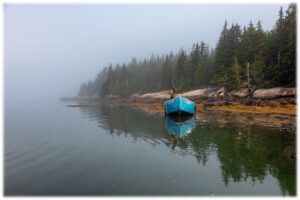 Yes, Rockweed beds play an important ecological role, but proper management can ensure economic benefits AND environmental sustainability!
Yes, Rockweed beds play an important ecological role, but proper management can ensure economic benefits AND environmental sustainability!
All cited references available below:
[1] Muhlin and Brawley (2019): http://Science Should Be Heeded: Rockweed Is Not a Plant
[2] Ugarte (2011) Journal of Applied Phycology 23: 401-407: https://www.acadianseaplantsmaine.com/wp-content/uploads/2023/03/Ugarte-2011.pdf
[3] Vadas et al. (2004) Northeastern Naturalist 11:123-142: https://www.acadianseaplantsmaine.com/wp-content/uploads/2023/03/Vadas-et-al-2004.pdf
[4] Lauzon-Guay et al. (2022) Marine Biology 169: https://www.acadianseaplantsmaine.com/wp-content/uploads/2023/03/Lauzon-Guay-et-al-2022.pdf
[5] DMR Rockweed Factsheet: https://www.acadianseaplantsmaine.com/wp-content/uploads/2023/03/DMR-Rockweed.pdf
[6] Johnston et al. (2023) Journal of Experimental Marine Biology and Ecology 561: https://www.acadianseaplantsmaine.com/wp-content/uploads/2023/03/Johnston-et-al-2023.pdf
[7] Ugarte et al. (2006) Journal of Applied Phycology 18:351-359: https://www.acadianseaplantsmaine.com/wp-content/uploads/2023/03/Ugarte-et-al-2006.pdf
[8] Walker (1948) Institute of Seaweed Research. SSRA Report n. 108: https://www.acadianseaplantsmaine.com/wp-content/uploads/2023/03/Walker-1948.pdf
[9] Lauzon-Guay et al. (2021) Journal of Applied Phycology 33:1695-1708: https://www.acadianseaplantsmaine.com/wp-content/uploads/2023/03/Lauzon-Guay-et-al-2021.pdf
[10] Beal (2015) Review of Existing Literature to Assess Effects of Rockweed Harvest on Marine Habitats and Invertebrates. Report to DMR Rockweed Working Group: https://www.acadianseaplantsmaine.com/wp-content/uploads/2023/03/Beal-2015.pdf
Read More »
